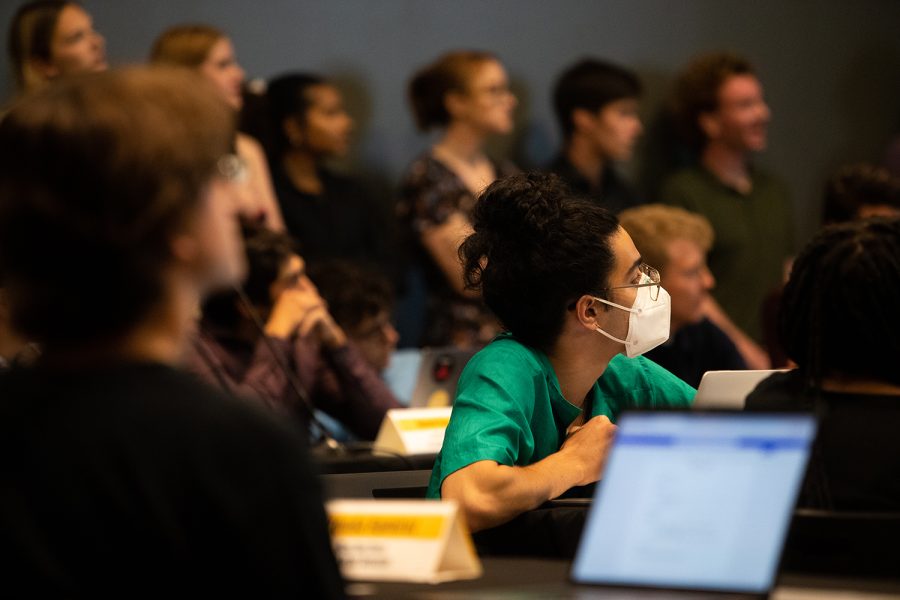USG passes resolution supporting UI sexual, reproductive health care access
The resolution emphasizes the value of reproductive health care access and highlights the variety of care found on the University of Iowa campus. USG plans to take no further action on the topic at this time.
Senators sit in at an Undergraduate Student Government Meeting in the Black Box Theater in the IMU on Tuesday, Sept. 20, 2022.
October 4, 2022
The University of Iowa Undergraduate Student Government passed a resolution on Sept. 27 supporting sexual and reproductive health care accessibility following the overturning of Roe v. Wade, which nationally eliminated the federal right to abortion.
The resolution, written by Sen. Hannah Williamsen, emphasizes the importance of reproductive health access for UI students.
In Iowa, abortion is currently banned at 20 weeks of pregnancy. It is unclear what the Iowa Legislature will do regarding abortion during its next session in January. Following the overturning of Roe v. Wade, Iowa Gov. Kim Reynolds filed a motion in August to challenge the injunction on a 2018 bill passed by the Legislature that would outlaw abortion at six weeks.
UI Student Health offers several sexual and reproductive health services including:
- Sexually transmitted infection testing and treatment
- Prescription and non-prescription contraception, IUDs, and Nexplanon
- General gynecologic care
- Free condoms
- Medications for HIV prevention
“This resolution should be important to us all, senators, because as all persons regardless of sex, race, or gender we can benefit from and utilize the university’s reproductive services,” Williamsen said.
RELATED: Reproductive health care clinics continue to provide services post-Roe
In an interview with The Daily Iowan after the USG meeting, Williamsen elaborated on the university’s reproductive services.
Due to the high quality of access to reproductive care at the UI, Williamsen said the USG Health and Safety Committee is not working on reproductive health care as one of their initiatives for this year.
“We’re saying if the state legislature were to say something where it would denature the importance of student reproductive access, then we would move forward and [create] something,” Williamsen said. “But at this moment in time, we’re just stating our opinion.”
Williamsen said she thinks the university does a good job helping students handle the costs of contraceptives.
“You can also get any form of STI testing, STD testing, pregnancy testing,” she said. “They can treat urinary tract infections, you know, bladder infections, which is in the resolution what we were talking about: access for all.”
Williamsen said she thinks students are in a good spot in terms of what is offered, but it’s still important for access to always be there for students.
Sen. Emma Speer spoke in the affirmation of the resolution at the Sept. 27 meeting.
“I also want to highlight that this isn’t just a now issue, but by providing health care to all persons on campus, we’re not benefiting our community now,” Speer said. “We’re also benefiting ourselves in the future when we can possibly avoid a lot of complications like cancer and end stage STIs.”
Sen. Madison Ross emphasized the value of protecting reproductive health care.
“The full value of protecting sexual and reproductive health services has been largely underestimated, and its significant benefits are for the most part unrecognized — especially medical conditions,” Ross said.



